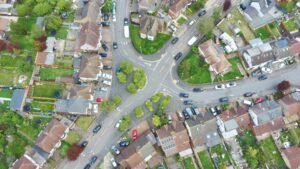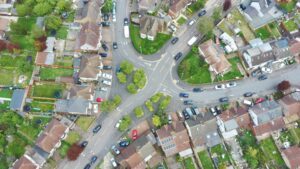
In a recent development that could have far-reaching implications for commercial drone businesses, the non-profit Institute for Justice (IJ) presented oral arguments in a First Amendment case in North Carolina. The case centers around a challenge to a North Carolina restriction on the creation of aerial maps, with serious potential consequences for commercial drone operators in the state.
The legal proceedings stem from a decision by Judge Louise W. Flanagan of the U.S. District Court for the Eastern District of North Carolina. The court upheld a state restriction against a First Amendment challenge brought by a Goldsboro, N.C., drone operator, Michael Jones, and the Institute for Justice.
Is Aerial Mapping the Same as Surveying? The NC Board of Engineers Says Yes
According to an IJ article published on April 3, 2023, the court acknowledged that the use of drones for capturing images is protected expression, but it ruled that North Carolina can penalize drone operators for creating and sharing even basic land information without obtaining a land-surveyor license. Unlike many states, North Carolina classifies basic aerial mapping as “surveying,” requiring a full surveyor’s license.
The Institute for Justice argues that licensing boards should not use their authority to stifle competition, emphasizing that creating and sharing visual information about land is a form of free speech protected by the Constitution. Despite these arguments, the district court rejected this perspective, prompting Michael Jones and his company, 360 Virtual Drone Services LLC, to appeal the decision to the 4th U.S. Circuit Court of Appeals.
In a statement, IJ Attorney James Knight expressed the belief that government intervention should not impede innovative businesses like Michael’s from serving their customers. The Institute for Justice, known for defending First Amendment rights and economic liberty nationwide, highlighted its success in similar cases, including the defense of a Mississippi mapping company in 2020.
A Related Victory
Additionally, the Institute for Justice scored another First Amendment victory as the deadline passed for the North Carolina Board of Examiners for Engineers and Surveyors to appeal Chief Judge Richard Myers’ decision. The decision held that the Board violated the First Amendment by ordering retired engineer Wayne Nutt to stop expressing opinions about engineering without a state license.
Represented by the Institute for Justice, Wayne Nutt filed the lawsuit after receiving threatening letters from the Board, demanding him to cease expressing opinions about engineering without a license. The court’s decision affirms that the power to license an occupation does not grant the power to censor speech, emphasizing the importance of individuals deciding who they want to listen to rather than relying on government restrictions.
These legal developments underscore the ongoing debate surrounding the intersection of technology, free speech, and government regulation, with implications for drone operators and individuals expressing professional opinions in North Carolina.
Read more:
Miriam McNabb is the Editor-in-Chief of DRONELIFE and CEO of JobForDrones, a professional drone services marketplace, and a fascinated observer of the emerging drone industry and the regulatory environment for drones. Miriam has penned over 3,000 articles focused on the commercial drone space and is an international speaker and recognized figure in the industry. Miriam has a degree from the University of Chicago and over 20 years of experience in high tech sales and marketing for new technologies.
For drone industry consulting or writing, Email Miriam.
TWITTER:@spaldingbarker
Subscribe to DroneLife here.

